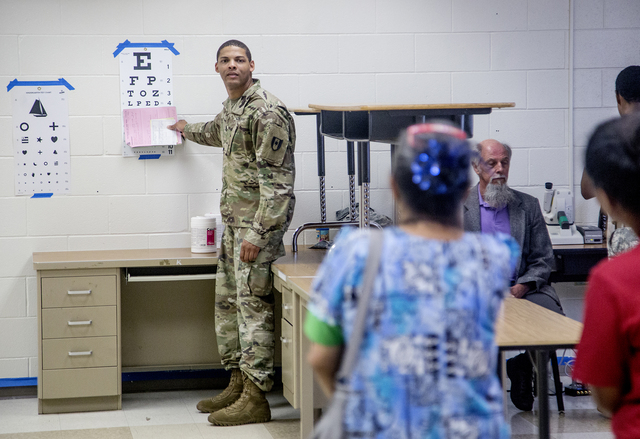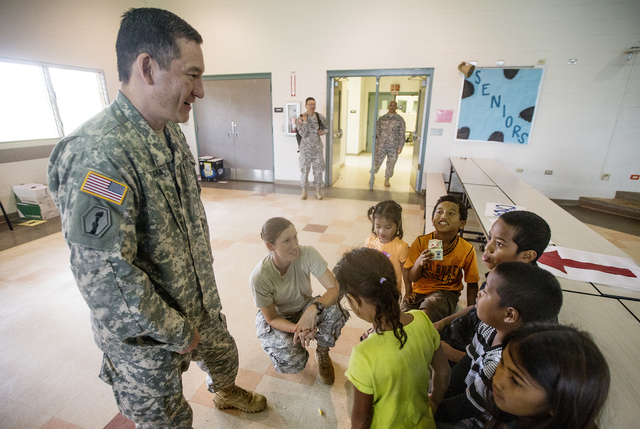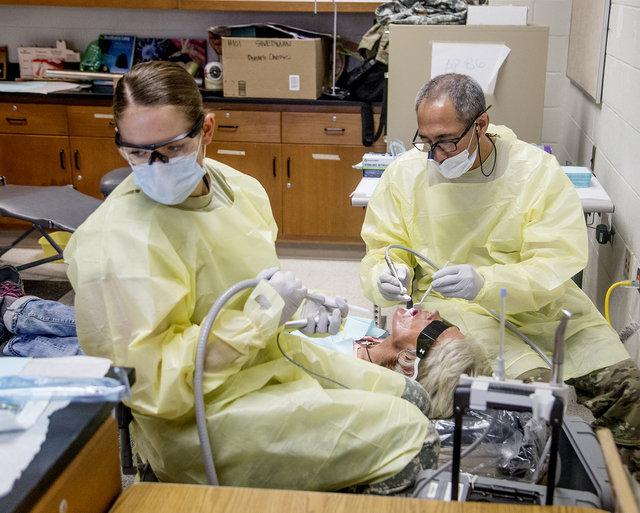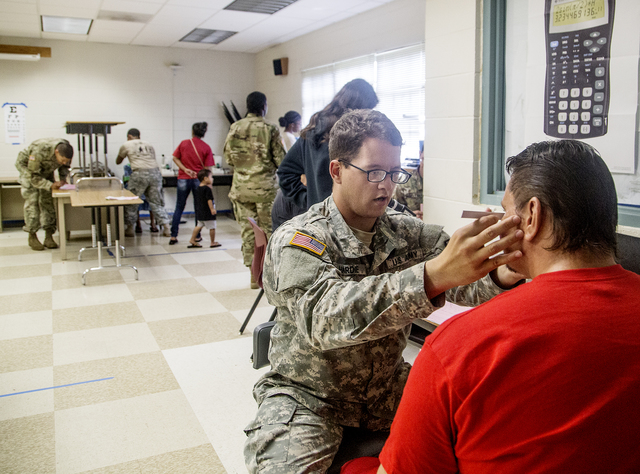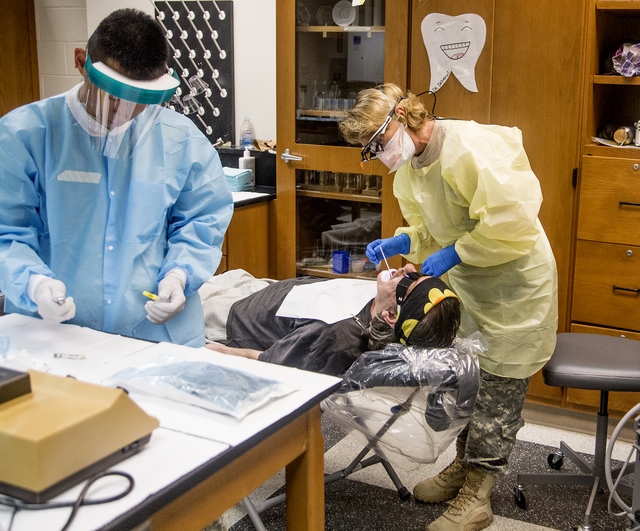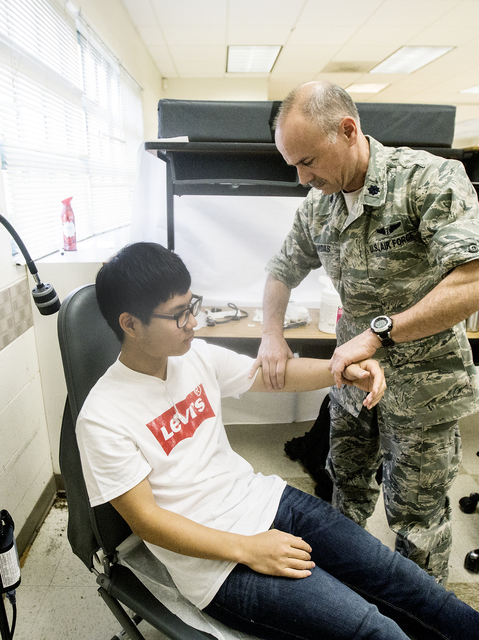Medical mission: Free health services offered during Tropic Care 2016 in Keaau
School’s out and the doctors are in.
ADVERTISING
For the past two days, the Keaau High School campus has been transformed into home base for Tropic Care 2016, a joint effort of the U.S. Army Reserve’s Innovative Readiness Training program, the state Department of Health and the County of Hawaii.
The program, which continues through Saturday, offers a host of medical services provided by more than 170 military physicians and medical providers.
And it’s all free.
“What we’re providing here is a little bit of everything,” said DOH public health educator Lenard Allen.
In the Keaau music room, triage — where people get their basic vital signs taken before moving on to other screenings — was set up beneath trumpet cases sitting on top of the lockers.
In the physics and chemistry labs, people received dental fillings and oral hygiene checkups. Across the hall, people sat for hearing tests and waited for their vision screenings in the two Project Visions vans (both shipped over from Oahu) parked outside. Other classrooms hosted health care seminars.
In the industrial arts room, an air compressor hummed as men and women in blue Navy working uniforms prepared custom prescription glasses.
“We have to bring this everywhere we go,” said Navy ophthalmologist Conward Bundrick, indicating three blue storage chests, each containing hundreds of lenses to be matched to future patients’ prescriptions.
The storage chests, along with the rest of the machinery needed to prepare a pair of glasses — the full process takes about a minute and a half — was brought to the Big Island on an Air Force C-17 flown from Fort Dix, N.J.
The same plane carried all the equipment needed for an Innovative Readiness Training mission, which had to be set up and packed out three times as it was ported around the island.
“It’s great,” Bundrick said, recalling a different mission when he gave a pair of glasses to a young girl who was able to see her own family members clearly for the first time. “People can see things that they haven’t before … it gives them a better quality of life.”
Last week, the team divided its time between Ka‘u High and the Ocean View Community Center.
“We wanted to have it in the most underserved areas,” said Martha Yamada, East Hawaii supervisor for the DOH Public Health Nursing section. She estimated about 2,900 people were served by the two Ka‘u Tropic Care clinics.
On Tuesday, county-provided buses brought Waimea residents to Keaau so they, too, could participate.
Malia Bolos of Pahoa brought her family to Wednesday’s Tropic Care so all could get dental and vision checkups — the most frequented stations, since both areas are expensive and not always covered by basic insurance.
“It’s awesome,” Bolos said. “You get good services, and everyone is really helpful.”
Bolos’ sons also got their physicals taken care of for school sports.
“I told (everyone), go check the medical exams,” she said. “You might as well do it; it’s here and free.”
Though this mission was led by the 1984th Army Reserve unit, part of United States Army Hospital Pacific on Oahu, several other military units from throughout the country traveled to the Big Island, including an Air Force National Guard unit from North Dakota. Affiliates from the United Kingdom and Germany medical reserve corps also participated.
“It’s really a win-win situation,” said Maj. Daniel Copp with the 1984th.
Because many medical service members are affiliated with a hospital and do their training on-site, they don’t get the mobile experience that will help them prepare for being sent to more challenging situations. For example, medical units were sent to help communities in Saipan last year after Typhoon Soudelor struck.
It took just more than a year to arrange for the Ka‘u and Puna IRT missions. The last Big Island clinic was in 2013. This is the first time Keaau has been served.
“They find a need in the community,” Copp said.
Sometimes IRT is oriented around medical screenings; other times it is focused on veteran services. The DOH applies to participate in IRT and, if accepted, works with the military teams to plan out the clinics. The Mayor’s Office and Hawaii County Council members Maile David and Greggor Ilagan also worked on coordination.
IRT is not primary care and is intended to fill certain gaps, Allen said. It’s just as important to connect people with local services they can continue to use: On Saturday, a fair also will be hosted at the high school, featuring several community health organizations.
Before attendees left, they received referrals to local providers for follow-up care and signed up for an insurance provider if they did not already have one.
Some picked up their new eyeglasses as they headed out.
The “small little services” make a big difference in people’s lives, Copp said.
“They’re so happy,” Yamada said. “Just the sparkle in their eyes.”
Email Ivy Ashe at iashe@hawaiitribune-herald.com.
——- —-
Tropic Care 2016 at Keaau High School
Hours:
Thursday and Friday
8:30 a.m.-3:00 p.m.
Saturday
8:30 a.m.-noon
Bring current glasses and current medication, if any. Be prepared for long waits.
For more information, call 974-6035


